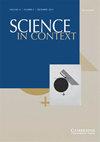万物有灵论和自然目的论,从阿维森纳到波义耳。
IF 0.5
4区 哲学
Q2 Arts and Humanities
引用次数: 4
摘要
历史学家声称,万物有灵论和自然目的论这两个密切相关的概念在科学革命中都被断然拒绝了。他们把罗伯特·博伊尔吹捧为反对前现代万物有灵论的早期现代守护者。在讨论阿维森纳、阿奎那和布里丹,以及文艺复兴时期的心理学时,我认为目的论经历了一个缓慢而不平衡的理性化过程。随着新柏拉图主义神学对亚里士多德自然哲学的影响,万物有灵论的意义也变得模糊起来。一些历史学家指出,波义耳就是这种不平衡过程的例证。在他的宗教信仰和他的经验实践中隐含的万物有灵论之间存在着一种未解决的紧张关系。本文章由计算机程序翻译,如有差异,请以英文原文为准。
Animism and natural teleology from Avicenna to Boyle.
Historians have claimed that the two closely related concepts of animism and natural teleology were both decisively rejected in the Scientific Revolution. They tout Robert Boyle as an early modern warden against pre-modern animism. Discussing Avicenna, Aquinas, and Buridan, as well as Renaissance psychology, I instead suggest that teleology went through a slow and uneven process of rationalization. As Neoplatonic theology gained influence over Aristotelian natural philosophy, the meaning of animism likewise grew obscure. Boyle, as some historians have shown, exemplifies this uneven process. There is an unresolved tension between his religious convictions and the implicit animism of his empirical practice.
求助全文
通过发布文献求助,成功后即可免费获取论文全文。
去求助
来源期刊

Science in Context
综合性期刊-科学史与科学哲学
CiteScore
0.80
自引率
0.00%
发文量
1
审稿时长
>12 weeks
期刊介绍:
Science in Context is an international journal edited at The Cohn Institute for the History and Philosophy of Science and Ideas, Tel Aviv University, with the support of the Van Leer Jerusalem Institute. It is devoted to the study of the sciences from the points of view of comparative epistemology and historical sociology of scientific knowledge. The journal is committed to an interdisciplinary approach to the study of science and its cultural development - it does not segregate considerations drawn from history, philosophy and sociology. Controversies within scientific knowledge and debates about methodology are presented in their contexts.
 求助内容:
求助内容: 应助结果提醒方式:
应助结果提醒方式:


